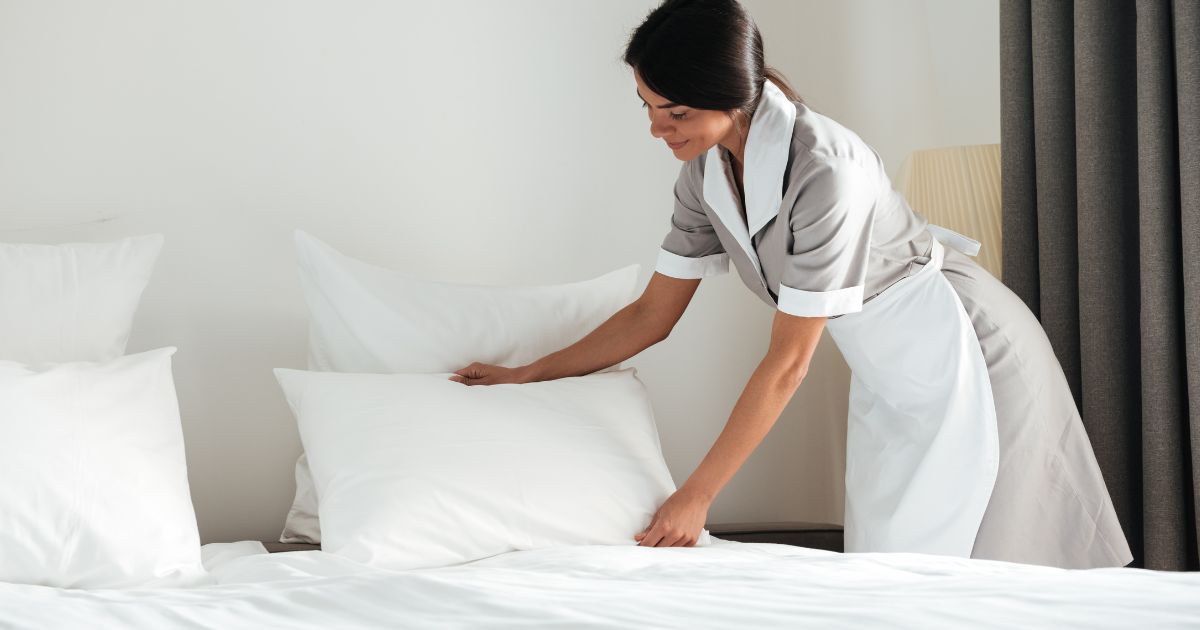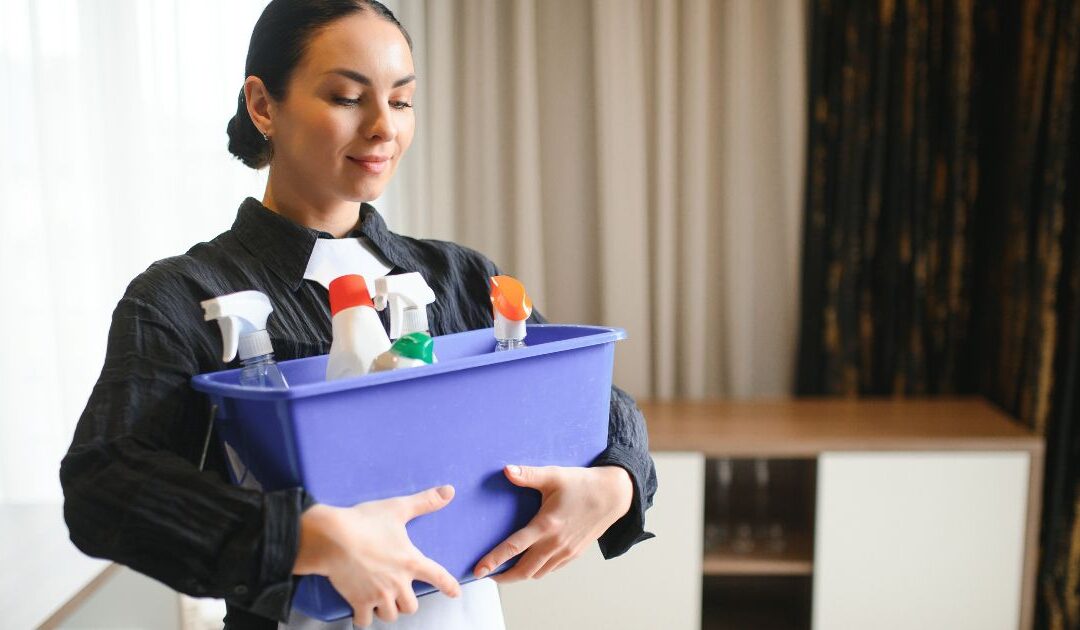What Is the Maid Right Franchise Opportunity?
Company Overview and Industry
Maid Right is a residential cleaning franchise geared toward home cleaning. It was launched in the early 2010s by Premium Service Brands (PSB) – the same franchisor behind commercial cleaning brands like Jan-Pro. According to business filings, Maid Right Franchising LLC was formed in 2013 and began offering franchise units that spring. The system is focused on house cleaning (homes, apartments and rental properties), with only minimal light commercial work on the side. The company has grown slowly: by 2019 there were only about 18 Maid Right franchisees, rising to 25 by the end of 2021. (There are no company-owned locations – all Maid Right outlets are franchised.) Notably, Maid Right emphasizes eco-friendly, hospital-grade cleaning: it touts a proprietary “Signature Clean®” system using non-toxic disinfectants to sanitize homes.
Today the U.S. home-cleaning market is large (on the order of $19 billion per year), and Maid Right pitches itself as a growing player in that space. The brand’s marketing highlights recurring residential business and repeat customers, positioning Maid Right as a “proven” home cleaning concept. Franchise partners benefit from PSB’s broader platform – for example, Maid Right franchisees get access to national marketing, technology and back-office support from the Premium Service Brands network. The Maid Right website also touts that the company “has set the standard for cleaning services” with tools like the Maid Right Signature Clean® and “MR Shield®” to stand out in customers’ homes. In short, Maid Right is a small but established residential-cleaning franchise, built on the strength of PSB’s national brand and systems.
What Franchisees Get
Maid Right franchisees are trained to deliver full-service house cleaning offerings. The franchise covers routine housekeeping, deep cleaning, move-in/move-out cleans, vacation rental preparation, apartment upkeep, seasonal and one-time cleans, and even a limited light-commercial service (e.g. small offices or medical offices). In practice, this means a Maid Right franchisee mainly handles residential clients – homeowners, busy professionals, landlords and short-term rental owners – by sending teams to clean their properties. Maid Right emphasizes recurring business (weekly, bi-weekly or monthly service plans) as the backbone of its model, aiming to build long-term customer relationships. (Indeed, company data shows about 71% of Maid Right’s annual revenue comes from recurring contracts.)
To run the business, Maid Right provides a complete support system. New owners receive about two weeks of initial “Master” training that covers all aspects of the cleaning operation. This is followed by ongoing training webinars and field support throughout the year. The training materials teach cleaning methods, customer service practices, and management skills. Maid Right also supplies a detailed operations manual and business systems so you can run quality-controlled cleanings from day one. Importantly, Maid Right franchisees benefit from PSB’s national resources: PSB coordinates national advertising campaigns, provides local marketing guidance and even advanced tools and technologies for scheduling, billing and hiring. As the Maid Right site notes, you “benefit from being part of Premium Service Brands,” gaining access to “powerful marketing strategies, cutting-edge technology, and coaching” that help you run and grow your cleaning business. In practice this means Maid Right owners can tap into established brand websites, customer referral programs, and lead-generation systems maintained by PSB – so you don’t have to build all of that from scratch.
It’s worth noting that Maid Right is explicitly not a passive or home-based model. The franchise disclosure language (and an IFPG summary) states owners should be involved in day-to-day operations (it is not a semi-absentee opportunity). In other words, as a Maid Right franchisee you would likely be hands-on at first – recruiting and managing cleaning crews, scheduling jobs and ensuring quality. (The model is lighter on equipment – you don’t need big machinery or a fixed facility, just cleaning supplies, so it can be run with a small mobile team.) Maid Right also provides support for growing your team: for example, the FDD indicates the franchisor offers recruiting assistance and co-operative advertising funds to help franchisees hire staff and market locally.
In terms of recent performance, Maid Right does not publish a formal Item 19 earnings claim for franchisees. However, FDD‑sourced data reveals that existing Maid Right franchises do moderate six-figure sales. For example, 16 fully-operating Maid Right outlets in 2021 averaged about $672,764 in gross revenue, with a median around $585,734. (In 2020 the average was ~$542K.) The top-performing Maid Right territories do significantly better – the top 25% of units averaged over $1.14 million in sales in 2021 according to franchisechatter.com. Maid Right’s own marketing even highlights a figure of $1,258,050 as the average for top-quartile franchisees. These numbers suggest that while many Maid Right owners earn in the mid-$5–600K range, high-growth units can surpass the seven-figure mark. Nevertheless, the range is wide (in 2021, the lowest-revenue franchise was under $200K), so individual results depend on market and execution.
Startup Costs and Ongoing Fees
Maid Right’s startup costs are modest compared to many businesses, but not trivial. The initial investment (as provided in the FDD) runs roughly from $103,600 to $147,500. This total includes the $65,000 franchise fee plus working capital and basic equipment. (Key expenses are vehicle and fuel ($1,500–$5,000), cleaning supplies and equipment ($3,500–$7,000), a one-time technology fee ($5,000), signage ($3,000–$4,000), plus 2–4 weeks of working capital or “additional funds” ($17,500–$40,000).) You generally do not need a commercial property (most franchisees run the business from home and travel to clients).
Ongoing fees include a 6% royalty on gross sales (with a $150/week minimum) and contributions to marketing funds. Maid Right requires 2% of sales into a national marketing fund. In addition, franchisees pay up to 2% of gross sales (or $10,000) annually into an advertising co-operative to fund local marketing. These royalties and fees ensure you benefit from corporate support and brand promotion. (For context, Maid Right’s royalties and fees are in line with the industry; as a comparison ServiceMaster Clean charges 4–7% royalty plus 0.5% ad fund.) In sum, Maid Right requires a mid-six-figure startup outlay and a standard royalty/marketing fee structure.
How the Industry Itself Compares
When weighing Maid Right against a commercial cleaning franchise like Assett, it helps to consider the nature of each industry. Residential home cleaning (Maid Right’s focus) and commercial cleaning (Assett’s focus) both offer recurring service income, but the markets and dynamics differ.
Maid Right Industry Advantages
- Growing demand for home services: Busy households often turn to professional cleaners for convenience. Modern demographics (dual-income families, elderly homeowners, vacation rentals) support a steady base of residential demand.
- Easier entry and quick setup: House cleaning requires relatively simple equipment (mops, vacuums, cleaning agents) and minimal licensing, so startup logistics are straightforward. You can often begin with a small crew, even as few as 1–2 cleaners, without major capital.
- Recurring appointments: Like office cleaning, successful home cleaning franchises build repeat customers (weekly/bi-weekly cleans). Secure, loyal contracts with homeowners can lead to stable, predictable work (e.g. recurring clients, Airbnb turnovers). Maid Right emphasizes exactly this – it designs services for repeat business at residences.
- Environmentally friendly niche: Maid Right’s proprietary cleaning system (Signature Clean® with hospital-grade disinfectants) can appeal to health-conscious homeowners. Franchisees can leverage this “green” positioning in marketing.
- Turnkey support for entrepreneurs: For first-time owners, Maid Right provides a proven system, training and brand recognition in the home cleaning space, which can reduce the learning curve. You’re buying a business in a box rather than starting solo.
However, there are tradeoffs with residential cleaning. The industry can be highly competitive and somewhat fragmented – there are many independent house cleaners and regional chains, which can pressure pricing. Homeowners may also be more price-sensitive or discretionary; in a tight economy some families might skip professional cleaning. Selling repeatedly into B2C markets often requires heavy marketing or word-of-mouth. In short, while residential cleaning has broad appeal, franchisees must be prepared for an emotional consumer market and intense local competition.
Compared to Commercial Cleaning Industry
The commercial cleaning industry (offices, schools, medical centers, etc.) offers several advantages over residential cleaning:
- Huge market size: The U.S. janitorial and commercial cleaning industry is enormous – on the order of $100+ billion annually. Businesses of all types require cleaning, from offices and banks to factories and schools. This means broad and growing demand for service. For context, research notes that even smaller players tap into this $100B+ market by servicing commercial clients.
- Essential, recession-resistant demand: Commercial cleaning is generally considered essential. Companies need clean facilities year-round, so contracts tend to be more stable even in downturns. For example, Jantize (a long-running janitorial franchise) notes that facility cleaning is “recession-resistant,” since businesses, hospitals and schools still must be cleaned in any economy. This stability can protect cash flow during slow economic periods.
- Long-term recurring contracts: Commercial clients often sign multi-year cleaning contracts, providing predictable recurring revenue. Unlike one-off house cleans, business clients usually lock in schedules (e.g. daily, nightly, weekly cleaning). The revenue is therefore not one-off but spread evenly over time. In fact, even Maid Right’s data shows ~71% of their sales were from recurring services – and that same recurring model applies strongly to office cleaning.
- Lower upfront cost per client: You can secure much larger contracts without heavy investment. For example, you don’t need expensive specialized equipment or real estate to scale up – just standard cleaning gear. You mainly invest in labor. This contrasts with industries like pest control or hauling that require heavy equipment or inventory. Commercial cleaning scales by adding accounts and crews, rather than buying costly machinery.
- High income potential (even semi-absentee): Because commercial accounts are larger, annual revenues per franchisee can easily reach or exceed $1M. (For instance, the top Maid Right franchises average $1.15M according to franchisechatter.com, and industry leaders like ServiceMaster Clean see top quartile outlets near $2M.) Assett Franchise explicitly trains owners to build a million-dollar business – the founder notes their model is “built and tested” to reach seven-figure revenues. Crucially, this can often be done with relatively few work hours: once a stable crew is in place, an owner may only need to oversee operations ~5 hours a week. In practice, Assett’s automated systems allow an owner to focus on growth and strategy rather than cleaning, making semi-absentee ownership realistic.
- Reliable B2B clients: Commercial clients are organizations (schools, offices, medical facilities, warehouses, etc. ) that renew contracts regularly. These customers typically don’t swap providers on a whim or haggle endlessly on price. They value reliability and compliance, and as a result they tend to stick with their cleaners long-term if service is good. This contrasts with residential customers, who can be more finicky or may treat cleaning as an optional luxury.
In summary, while Maid Right’s residential-cleaning model offers an accessible entry point and recurring consumer demand, the commercial cleaning industry provides larger-scale, more stable and potentially more profitable opportunities. Assett Franchise capitalizes on these strengths: it serves the multi-billion-dollar commercial cleaning market, focuses on reliable recurring contracts, and is structured to scale efficiently without massive upfront equipment or facility costs.
How the Assett Franchise Compares
Now let’s compare Maid Right directly to the Assett Franchise, a commercial cleaning franchise brand. Assett is a family-owned, founder-led cleaning franchise that operates in the commercial (B2B) space. Here’s how Assett stacks up:
Simpler Systems, Bigger Potential
Assett is already entrenched in commercial cleaning, not residential, so its entire system is geared toward large-scale facilities. This means the model is designed to be a professional, high-revenue business rather than a small “one-person” operation. You do not need prior cleaning experience – Assett provides a full franchise playbook and training for office and facilities cleaning. In fact, Assett’s founders explicitly built their program for entrepreneurs who want to work on their business, not in it. The franchise comes with proven systems for sales, bidding, operations and management, so an owner focuses on strategy instead of guesswork.
The upside for franchisees is substantial. Both Assett and legacy commercial brands have delivered million-dollar businesses. Even though Assett is a newer company, it has already produced 7-figure results for franchise owners. As the Assett leadership notes, the model was “built and tested to reach seven-figure revenues,” and early Assett locations have exceeded $1,000,000 in annual sales. In other words, Assett was created from the ground up to reach the same revenue level that high performers in Maid Right achieved, but in what can be a leaner, business-to-business market.
By contrast, Maid Right franchisees – being in residential cleaning – tend to hit the mid-six-figure range more often. Assett’s commercial focus and support make the $1M+ potential more reliable. Assett also emphasizes growth: unlike large established brands, Assett is still expanding nationwide, so new owners can grab exclusive territories with less competition. (Whereas Maid Right’s tiny network has more limited territory availability.) In short, Assett offers a simpler, executive-friendly system with even bigger upside: a franchise run like a business (not a side job), with a clear path to a million-dollar company.
Automated Hiring = Time and Money Saved
One of Assett’s standout features is its proprietary automated hiring system. Labor is the hardest part of any cleaning business, and Assett has engineered technology to handle recruitment for you. Instead of spending 20–30 hours a week writing job ads, interviewing applicants and coordinating paperwork (the typical burden on a new cleaning business owner), Assett’s system streamlines the entire process.
This automation makes a huge difference. According to Assett’s analysis, a franchisee would otherwise dedicate 20–30 hours each week just to hiring and training staff. With Assett’s platform, those tasks are handled by software: job postings are auto-generated, candidate screening is automated, and qualified worker pools are maintained. The result is that franchise owners can save 20–30 hours per week (or the equivalent salary of a full-time manager) simply by letting the system do the heavy lifting.
In practice, this means less time in HR and more time focused on managing client accounts and growing the business. Having a reliable workforce is critical for quality and retention, and Assett’s technology ensures a steady pipeline of pre-screened cleaning staff. By comparison, a Maid Right owner would need to recruit and vet cleaners through more manual means, potentially eating into valuable time. Assett’s automated hiring is a real operational edge – it cuts out one of the biggest headaches and expense drivers in cleaning, giving franchisees both more free time and lower labor costs.
Personalized and Founder-Led
Assett sets itself apart with its family-owned, founder-led culture. Assett Commercial Services was founded by Matt Pencarinha, who still heads the company and remains personally involved, as stated at bizbuysell. This means franchisees often deal directly with decision-makers. In fact, Assett’s founder is known to participate in training new franchisees himself. Many Assett owners report being able to pick up the phone and get guidance directly from the top – something rarely possible with larger corporate franchises.
This founder-led model creates a more personal franchise experience. Assett promotes a close-knit culture and community mission, rather than a distant corporate structure. For example, while a giant like ServiceMaster Clean is part of a multi-brand conglomerate, Assett highlights that it is family-owned. The implication is that the franchisor will be more responsive, flexible and community-focused. Indeed, Assett’s marketing emphasizes mentorship and relationship-building; the company has a “community-oriented” approach. Franchisees looking for personal attention and involvement from leadership often find Assett’s structure refreshing.
Additionally, being an emerging brand means Assett can be nimble. New franchisees get to join at an early stage of growth, contributing feedback to shape future training and tools. The clear mission of Assett (as a growing American small-business franchisor) also appeals to those who want to support a “homegrown” company. In summary, Assett offers a small-company feel with direct access to its founder, whereas Maid Right (through PSB) is part of a much larger corporate portfolio. This entrepreneur-friendly environment – with Matt Pencarinha’s leadership – can make Assett attractive for owners who value mentorship and agility.
Final Thoughts
Maid Right’s franchise can certainly be a good fit for some entrepreneurs. It has the backing of a national brand (PSB), and it taps into the $19B residential cleaning market. It appeals particularly to someone who wants a hands-on, community-oriented business working with families and homes. Maid Right’s strengths include a complete system for home cleaning and a clear focus on healthy, non-toxic services.
That said, Assett Franchise offers several advantages for many prospective owners. With Assett, you get a $1M+ scalable business model that is simpler to run and more recession-proof. You don’t have to retrain from another field because Assett is already in the cleaning industry (the much larger commercial segment). Assett is structured so you can work on the business: hire and train great crews automatically, handle sales and management via proven systems, and step back from day-to-day cleaning. You also benefit from a modern franchise that emphasizes recurring B2B contracts and low operational complexity. As a stable service business, commercial cleaning provides predictable recurring revenue from long-term contracts with schools, offices, healthcare facilities, etc.. Unlike residential cleaning, the risk of seasonal slowdowns or consumer price-shopping is much lower.
In practical terms, this means Assett owners often enjoy more time freedom and faster ROI. Assett’s automated hiring saves dozens of hours per week, and the high revenue potential (demanding a nearly zero inventory) means profits can be substantial. The Assett model was designed for an owner to reach seven-figure earnings without having to invest in expensive equipment or real estate. In addition, since Assett is founder-led and community-focused, franchisees benefit from personal guidance and a mission-driven culture – rather than being a small part of a vast corporate machine.
If you’re exploring franchise opportunities and want a model that can deliver long-term income, flexibility, and control — we’d love to show you how Assett Franchise can help you build a business that works for your life. Visit https://assettfranchise.com to connect with our team and learn more.




